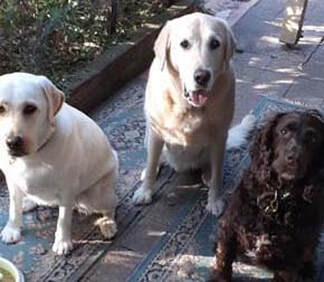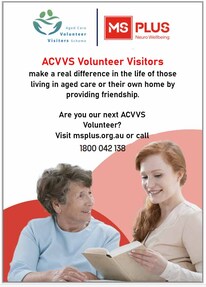 For Antonietta, being an aged care volunteer visitor is an opportunity to share good times with a special friend. Her dogs accompany her on some of her visits.
For Antonietta, being an aged care volunteer visitor is an opportunity to share good times with a special friend. Her dogs accompany her on some of her visits. By Jen Riley
GETTING older can be a lonely experience for some people. Seeing a friendly face and having a regular visitor can help change that.
The Aged Care Volunteer Visitors Scheme (formerly known as the Community Visitors Scheme) matches volunteer visitors to residents living in an aged care facility or living in their own home. The program aims to help diminish the feelings of isolation and loneliness.
I asked Antonietta, one of our wonderful visitors in the Bass Coast area, to explain what makes this program so special, for visitors as well as residents.
GETTING older can be a lonely experience for some people. Seeing a friendly face and having a regular visitor can help change that.
The Aged Care Volunteer Visitors Scheme (formerly known as the Community Visitors Scheme) matches volunteer visitors to residents living in an aged care facility or living in their own home. The program aims to help diminish the feelings of isolation and loneliness.
I asked Antonietta, one of our wonderful visitors in the Bass Coast area, to explain what makes this program so special, for visitors as well as residents.
Jen Riley: Antonietta, can you begin by outlining what made you want to volunteer with the ACVVS?
Antonietta: In the past, I’d volunteered in aged care with my dogs and cat. The joy and calm it brought to both the people we visited and myself was wonderful. Even my pets really enjoyed it!
During the COVID pandemic, more than ever, I realised that there was a need to be connected to our elderly and vulnerable community members. This was the perfect way to thank our amazing senior citizens for their life contributions.
Antonietta: In the past, I’d volunteered in aged care with my dogs and cat. The joy and calm it brought to both the people we visited and myself was wonderful. Even my pets really enjoyed it!
During the COVID pandemic, more than ever, I realised that there was a need to be connected to our elderly and vulnerable community members. This was the perfect way to thank our amazing senior citizens for their life contributions.
Jen: How long have you been with the ACVVS program?
Antonietta: I’ve been volunteering with the program for almost two years.JR: What’s the best part about your role as an ACVVS volunteer?
Antonietta: The people I’ve met. The individual recipients that we (my pets and I) have been matched to over my volunteering journey have been such a pleasure to meet. It’s such a gift to hear their history and life stories.
Being a volunteer visitor who takes her pets in to visit tends to attract other residents within the facility who also enjoy a pat and “hello”. The moment may be brief but their excitement and expressions when interacting with the animals is priceless.
It’s also been a pleasure to meet the staff members of the facility; they take such wonderful care of their residents.
Antonietta: I’ve been volunteering with the program for almost two years.JR: What’s the best part about your role as an ACVVS volunteer?
Antonietta: The people I’ve met. The individual recipients that we (my pets and I) have been matched to over my volunteering journey have been such a pleasure to meet. It’s such a gift to hear their history and life stories.
Being a volunteer visitor who takes her pets in to visit tends to attract other residents within the facility who also enjoy a pat and “hello”. The moment may be brief but their excitement and expressions when interacting with the animals is priceless.
It’s also been a pleasure to meet the staff members of the facility; they take such wonderful care of their residents.
| ***** As the program co-ordinator of the scheme for the Bass Coast and South Gippsland shires, I would love to see more volunteer visitors. I am looking for people who enjoy spending time with elderly people, and who want to be a listening ear, friendly face, and a friend. We ask that our volunteer visitors commit to weekly (preferred) or fortnightly visits and are with the program for a minimum of 12 months. Some of our visitors have been with the program for many years and have been visiting their older friend for the entirety of their volunteering. |
MS Plus is funded by the State Government to provide the visitors program in the Bass Coast region but our recipients do not necessarily have multiple sclerosis. We have been providing the program since 1992 to many people whose quality of life has been improved by friendship and companionship.
Jen Riley is Bass Coast and South Gippsland program coordinator of the visitors program. To find out more about volunteering, contact her at [email protected] or Ph 9845 2943.
Jen Riley is Bass Coast and South Gippsland program coordinator of the visitors program. To find out more about volunteering, contact her at [email protected] or Ph 9845 2943.
